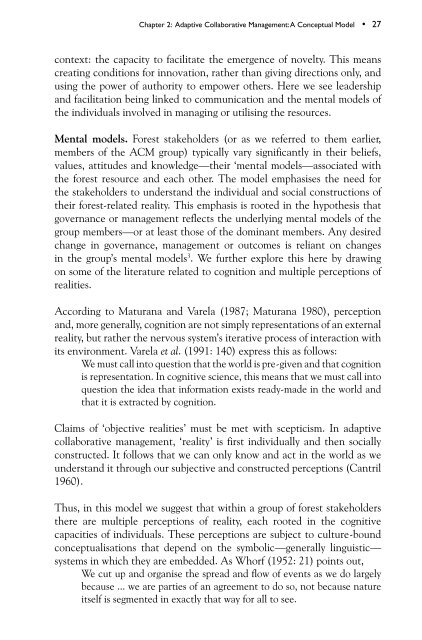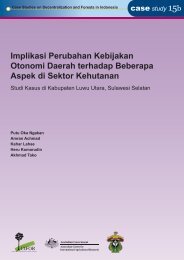Adaptive collaborative management of community forests in Asia ...
Adaptive collaborative management of community forests in Asia ...
Adaptive collaborative management of community forests in Asia ...
Create successful ePaper yourself
Turn your PDF publications into a flip-book with our unique Google optimized e-Paper software.
Chapter 2: <strong>Adaptive</strong> Collaborative Management: A Conceptual Model • 27<br />
context: the capacity to facilitate the emergence <strong>of</strong> novelty. This means<br />
creat<strong>in</strong>g conditions for <strong>in</strong>novation, rather than giv<strong>in</strong>g directions only, and<br />
us<strong>in</strong>g the power <strong>of</strong> authority to empower others. Here we see leadership<br />
and facilitation be<strong>in</strong>g l<strong>in</strong>ked to communication and the mental models <strong>of</strong><br />
the <strong>in</strong>dividuals <strong>in</strong>volved <strong>in</strong> manag<strong>in</strong>g or utilis<strong>in</strong>g the resources.<br />
Mental models. Forest stakeholders (or as we referred to them earlier,<br />
members <strong>of</strong> the ACM group) typically vary significantly <strong>in</strong> their beliefs,<br />
values, attitudes and knowledge—their ‘mental models—associated with<br />
the forest resource and each other. The model emphasises the need for<br />
the stakeholders to understand the <strong>in</strong>dividual and social constructions <strong>of</strong><br />
their forest-related reality. This emphasis is rooted <strong>in</strong> the hypothesis that<br />
governance or <strong>management</strong> reflects the underly<strong>in</strong>g mental models <strong>of</strong> the<br />
group members—or at least those <strong>of</strong> the dom<strong>in</strong>ant members. Any desired<br />
change <strong>in</strong> governance, <strong>management</strong> or outcomes is reliant on changes<br />
<strong>in</strong> the group’s mental models 3 . We further explore this here by draw<strong>in</strong>g<br />
on some <strong>of</strong> the literature related to cognition and multiple perceptions <strong>of</strong><br />
realities.<br />
Accord<strong>in</strong>g to Maturana and Varela (1987; Maturana 1980), perception<br />
and, more generally, cognition are not simply representations <strong>of</strong> an external<br />
reality, but rather the nervous system’s iterative process <strong>of</strong> <strong>in</strong>teraction with<br />
its environment. Varela et al. (1991: 140) express this as follows:<br />
We must call <strong>in</strong>to question that the world is pre-given and that cognition<br />
is representation. In cognitive science, this means that we must call <strong>in</strong>to<br />
question the idea that <strong>in</strong>formation exists ready-made <strong>in</strong> the world and<br />
that it is extracted by cognition.<br />
Claims <strong>of</strong> ‘objective realities’ must be met with scepticism. In adaptive<br />
<strong>collaborative</strong> <strong>management</strong>, ‘reality’ is first <strong>in</strong>dividually and then socially<br />
constructed. It follows that we can only know and act <strong>in</strong> the world as we<br />
understand it through our subjective and constructed perceptions (Cantril<br />
1960).<br />
Thus, <strong>in</strong> this model we suggest that with<strong>in</strong> a group <strong>of</strong> forest stakeholders<br />
there are multiple perceptions <strong>of</strong> reality, each rooted <strong>in</strong> the cognitive<br />
capacities <strong>of</strong> <strong>in</strong>dividuals. These perceptions are subject to culture-bound<br />
conceptualisations that depend on the symbolic—generally l<strong>in</strong>guistic—<br />
systems <strong>in</strong> which they are embedded. As Whorf (1952: 21) po<strong>in</strong>ts out,<br />
We cut up and organise the spread and flow <strong>of</strong> events as we do largely<br />
because ... we are parties <strong>of</strong> an agreement to do so, not because nature<br />
itself is segmented <strong>in</strong> exactly that way for all to see.
















